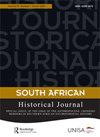Forging an Alternative to Separate Development: Afrikaner Sociology, the Apartheid State, and the ‘Coloured’ Question (c.1932–1984)
IF 1
3区 历史学
Q1 HISTORY
引用次数: 0
Abstract
ABSTRACT This article makes an intervention into the historiography which has positioned Afrikaner sociology as an unambiguous instrument of the apartheid state. In doing so, the article examines how leading Afrikaner sociologists used Parsonian structural functionalism to engage with the coloured question in the 1970s – articulated as the conundrum of where to position coloureds politically in the absence of direct representation in parliament. The primary argument is that this form of differentiated knowledge production was ‘alternative’ in the context of Afrikaner sociology’s early ties to Afrikaner nationalism because it challenged Verwoerdian separate development and replaced it with the idea that coloureds shared ‘common values’ with white society. This argument is made by tracing how Afrikaner sociologists’ calls for coloured representation gained momentum in the early 1970s, initiating a set of reforms which may be viewed as a resolution to the coloured question through the establishment of the Tricameral Parliament in 1984.打造独立发展的替代方案:南非白人社会学、种族隔离国家和“有色人种”问题(c.1932-1984)
摘要本文对将南非白人社会学定位为种族隔离国家的明确工具的史学进行了干预。在这样做的过程中,这篇文章考察了20世纪70年代,南非白人社会学家是如何利用帕森斯结构功能主义来处理有色人种问题的——这一问题被表述为在议会中没有直接代表的情况下,将有色人种政治定位在哪里的难题。主要论点是,在南非白人社会学与南非白人民族主义的早期联系背景下,这种差异化的知识生产形式是“另类的”,因为它挑战了Verwoerdian的独立发展,取而代之的是有色人种与白人社会共享“共同价值观”。这一论点是通过追溯南非社会学家对有色人种代表性的呼吁在20世纪70年代初如何获得势头而提出的,他们发起了一系列改革,这些改革可以被视为通过1984年建立的三院制议会来解决有色人种问题。
本文章由计算机程序翻译,如有差异,请以英文原文为准。
求助全文
约1分钟内获得全文
求助全文
来源期刊

South African Historical Journal
Multiple-
CiteScore
0.70
自引率
0.00%
发文量
37
期刊介绍:
Over the past 40 years, the South African Historical Journal has become renowned and internationally regarded as a premier history journal published in South Africa, promoting significant historical scholarship on the country as well as the southern African region. The journal, which is linked to the Southern African Historical Society, has provided a high-quality medium for original thinking about South African history and has thus shaped - and continues to contribute towards defining - the historiography of the region.
 求助内容:
求助内容: 应助结果提醒方式:
应助结果提醒方式:


